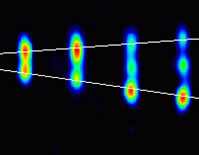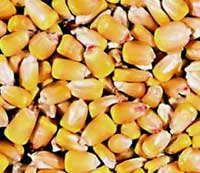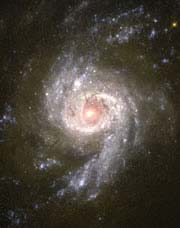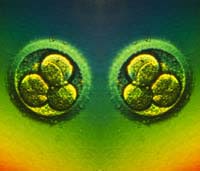
Surprising black hole weigh-in has astronomers scratching their heads.
Forty thousand light years away, on the other side of the Milky Way, lies object GRS1915+105. It is a giant star and a black hole orbiting one another, blasting out X-rays and ejecting gas and dust at close to the speed of light.
Now measurements of this “extreme and puzzling” object are casting doubt on current theories of how such binary systems form and behave. Astronomers have weighed its black hole,

Generally speaking, we go to great lengths to rid our bodies of foreign bacteria, whether it’s by brushing our teeth, washing our hands or taking antibiotics. But new research suggests that when it comes to treating tumors, we may one day invite the bugs in. According to a study published yesterday in the early online edition of the Proceedings of the National Academy of Sciences, a bacterium that normally resides in soil, dust and dead flesh quickly destroys large tumors in mice when injected along

In news that will surely fan the flames of the heated debate over genetically modified crops, scientists have found evidence that genes from GM plants can spread far and wide to native ones. According to a report published today in the journal Nature, wild corn from the remote mountains of Oaxaca, Mexico contains transgenic DNA. This, the researchers note, bolsters concerns that such unintentional contamination can threaten the genetic diversity of natural crops.
DNA analyses of the Oaxaca

It’s official: English football teams score fewer goals.
Soccer teams worldwide are scoring more goals than they ought to be, whereas English teams seem to follow statistical expectations. The news may delight fans outside England, but it is puzzling the physicists who have found that the chance of a high-scoring game is significantly greater than it may first appear 1 .
John Greenhough and colleagues at Warwick University in Coventry, England, analysed the s

Hubble spots atmosphere on planet 150 light years away.
Astronomers have glimpsed the atmosphere of a planet in a solar system other than our own for the first time. The feat is a first step towards detecting planets capable of supporting life elsewhere in the Universe.
David Charbonneau, of the California Institute of Technology, Pasadena, and colleagues, pointed the Hubble space telescope at the planet, which lies 150 light years away in the constellation Pegasus. Of the 7

Rewiring the egg: mechanism remains murky.
From a scientific viewpoint, the cloning of human embryos may be more of a step than a leap, say sceptics. If the signals that turn adult cells into embryonic ones can be found, the creation of cloned embryos for tissue repair may become redundant.
Researchers at Advanced Cell Technology (ACT) in Worcester, Massachusetts, now report that they have created cloned human embryos. They aimed to make blastocysts, hollow balls of cells fr

At the Berlin synchrotron radiation source BESSY II, the largest magnetic anisotropy of a single molecule ever measured experimentally has been determined. The larger this anisotropy is, the better a…

LSU quantum researchers uncover hidden quantum behaviors within classical light, which could make quantum technologies robust. Understanding the boundary between classical and quantum physics has long been a central question…

One of the biggest mysteries in science – dark energy – doesn’t actually exist, according to researchers looking to solve the riddle of how the Universe is expanding. For the…

A team led by plant biotechnologist Prof Markus Schwarzländer from the University of Münster and biochemist Prof Bruce Morgan from Saarland University has developed new biosensors with which the ratio…

How deubiquitinases USP53 and USP54 cleave long polyubiquitin chains and how the former is linked to liver disease in children. Deubiquitinases (DUBs) are enzymes used by cells to trim protein…

Conceptual blueprint to analyze experimental catalyst data. Machine learning (ML) models have recently become popular in the field of heterogeneous catalyst design. The inherent complexity of the interactions between catalyst…

How simulations help manufacturing of modern displays. Modern materials must be recyclable and sustainable. Consumer electronics is no exception, with organic light-emitting diodes (OLEDs) taking over modern televisions and portable…

“Neurons that fire together, wire together” describes the neural plasticity seen in human brains, but neurons grown in a dish don’t seem to follow these rules. Neurons that are cultured…

The quest for sustainable energy solutions has been a major focus of scientific research for decades. Solar energy, a clean and renewable source, has emerged as a promising alternative to…

Pacific Northwest National Laboratory to contribute leadership to national effort in microelectronics design and development. Microelectronics run the modern world. Staying ahead of the development curve requires an investment that…

With a processing speed a billion times faster than nature, chip-based laser neuron could help advance AI tasks such as pattern recognition and sequence prediction. Researchers have developed a laser-based…

New technology could remotely identify various types of plastics, offering a valuable tool for future monitoring and analysis of oceanic plastic pollution. Researchers have developed a new hyperspectral Raman imaging…